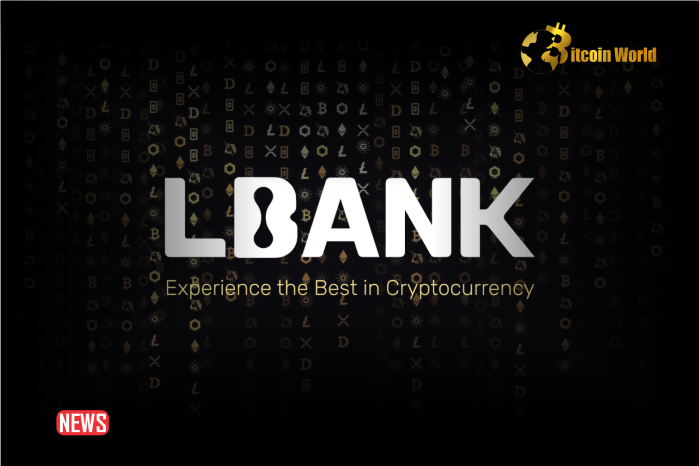Navigating the ever-evolving world of cryptocurrency exchanges can feel like traversing a maze, especially when regulatory red flags pop up. Recently, global crypto exchange LBank found itself in the spotlight of Japan’s Financial Services Agency (FSA). Why? For allegedly operating within Japan’s borders without the necessary license. Let’s dive into what this means for LBank, its users, and the broader crypto landscape.
What Exactly Happened? FSA’s Warning to LBank
The Financial Services Agency (FSA), Japan’s financial regulator, has issued a stern warning to LBank Exchange, citing concerns over its unlicensed operations in the country. According to the FSA, LBank has been offering crypto exchange services to Japanese residents without proper registration. This is a significant issue because Japan has a robust regulatory framework for cryptocurrency exchanges designed to protect users and maintain market integrity.
- Unlicensed Operations: The core of the FSA’s warning is that LBank is allegedly operating in Japan without the required registration. This is a violation of Japanese financial regulations.
- Lack of Transparency: The FSA reportedly pointed out that LBank Exchange has an “unknown address” and an “unknown representative.” This lack of transparency raises concerns for regulators who need to be able to identify and communicate with exchanges operating within their jurisdiction.
- Targeting Japanese Residents: The FSA stated that LBank is conducting business online with Japanese residents as counterparties. This indicates that the exchange is actively engaging with the Japanese market, thus falling under the FSA’s regulatory purview.
Why is Japan’s FSA Taking Action?
Japan has been proactive in regulating the cryptocurrency industry. The FSA’s actions against LBank are not isolated incidents. They are part of a broader trend of increasing regulatory scrutiny on crypto exchanges worldwide, and particularly in Japan. Here’s why the FSA’s stance is crucial:
- Protecting Investors: A primary goal of financial regulation is to protect consumers and investors. Unlicensed exchanges may not adhere to the same standards of security, transparency, and customer protection as registered platforms, potentially putting Japanese users at risk.
- Combating Illicit Activities: Properly regulated exchanges are subject to anti-money laundering (AML) and counter-terrorism financing (CFT) measures. Unlicensed operations can become conduits for illicit financial flows, which regulators are keen to prevent.
- Maintaining Market Integrity: Regulation ensures fair and orderly markets. Unlicensed exchanges operating outside regulatory oversight can undermine the integrity of the financial system.
LBank’s Perspective and Operations
Founded in 2015, LBank has positioned itself as a leading global centralized exchange (CEX). It boasts a wide array of trading options, including popular cryptocurrencies like Bitcoin (BTC), Ethereum (ETH), and numerous altcoins. While LBank operates globally, this warning from the FSA highlights the challenges exchanges face when navigating diverse regulatory landscapes.
Adding to the complexity, crypto reporter Colin Wu highlighted the FSA’s warning via an X (formerly Twitter) post, bringing further public attention to the issue.
Japan's FSA Warns LBank Exchange for Operating Without Registrationhttps://twitter.com/WuBlockchain/status/1801790073039634671
— Wu Blockchain (@WuBlockchain) June 15, 2024
LBank Not Alone: FSA’s Previous Actions
It’s important to note that LBank isn’t the first crypto exchange to face the FSA’s regulatory gaze. The Japanese agency has previously issued alert notices against other prominent exchanges like Bybit Fintech Limited, MEXC Global, Bitget Limited, and Bitforex Limited. The FSA’s allegations against these platforms were also centered on operating without proper registration, leading to service bans in Japan. This consistent approach underscores the FSA’s commitment to enforcing its regulatory framework.
New Listings Amidst Regulatory Scrutiny: Aethir (ATH) on LBank
Interestingly, even as it faces scrutiny from Japanese regulators, LBank recently announced the listing of Aethir (ATH) on June 12th. This listing provides users with the opportunity to trade the ATH/USDT pair on the platform. Aethir is described as a decentralized cloud computing platform leveraging Graphical Processing Units (GPUs). Listing new and potentially popular tokens like ATH could be seen as a strategy by LBank to continue attracting users and diversifying its offerings, despite the regulatory headwinds.
What Does This Mean for Crypto Users and the Future?
The FSA’s warning to LBank and similar actions against other exchanges signal a clear message: regulatory compliance is non-negotiable in Japan’s crypto market. For crypto users, this situation highlights several key takeaways:
- Be Informed: Always check if a crypto exchange is registered and compliant with local regulations, especially if you are based in a jurisdiction with strict rules like Japan.
- Platform Risk: Using unlicensed exchanges can carry higher risks due to a lack of regulatory oversight and potential vulnerabilities in security and operations.
- Global Regulatory Trend: The Japanese FSA’s actions are part of a broader global trend of increased regulatory scrutiny in the crypto space. Expect more countries to tighten their rules and enforcement.
In Conclusion: Navigating the Regulatory Maze
The situation with LBank and the Japan FSA serves as a critical reminder of the evolving regulatory landscape in the cryptocurrency world. While crypto offers exciting opportunities, operating within legal frameworks is paramount for long-term sustainability and user trust. As regulations become more defined and enforced globally, exchanges and users alike must prioritize compliance and transparency to ensure a safer and more robust crypto ecosystem. The FSA’s actions underscore that Japan is serious about crypto regulation, setting a precedent that other nations may follow as they navigate the complexities of digital asset oversight.
Disclaimer: The information provided is not trading advice, Bitcoinworld.co.in holds no liability for any investments made based on the information provided on this page. We strongly recommend independent research and/or consultation with a qualified professional before making any investment decisions.



